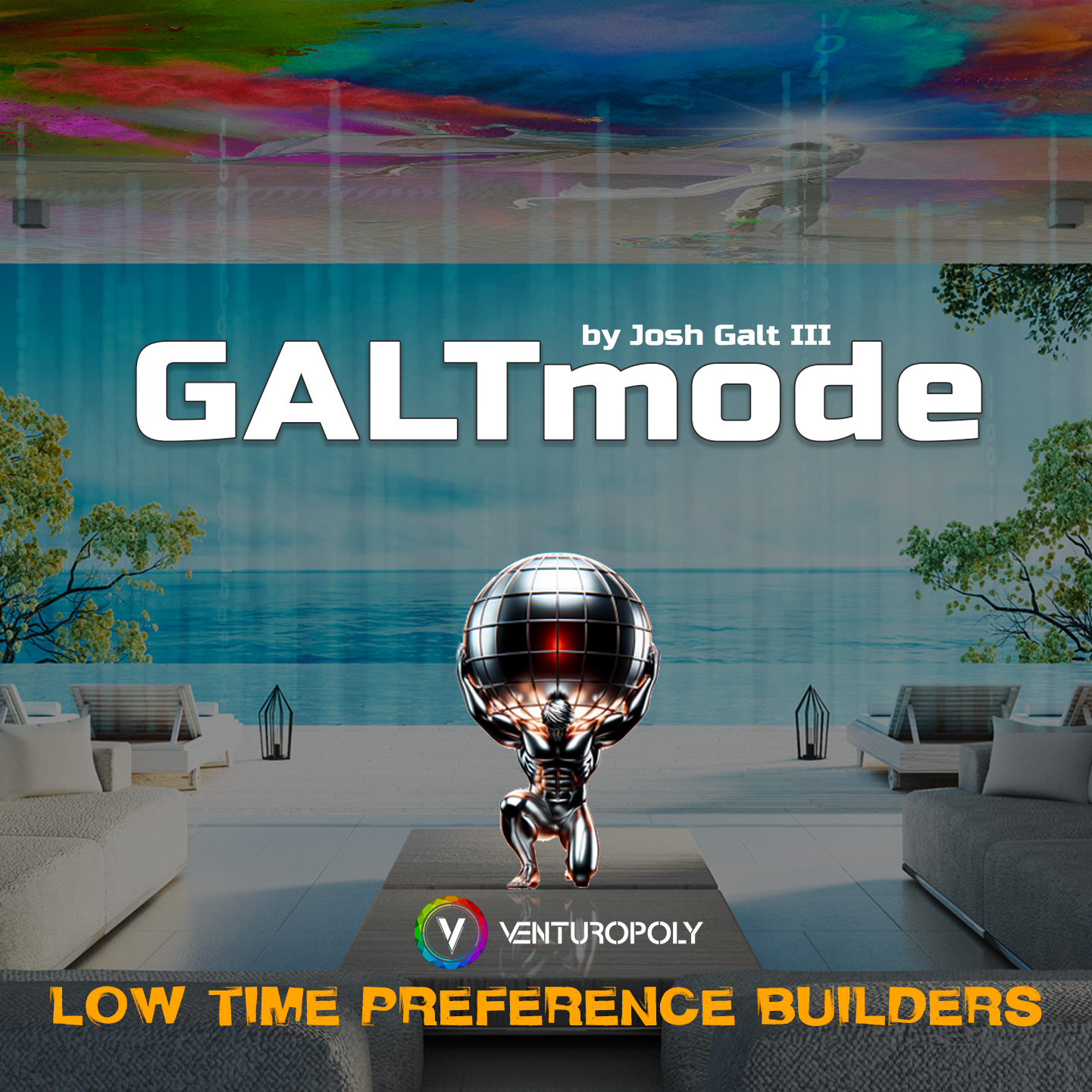Episode Transcript
[00:00:00] Foreign.
[00:00:04] So I said I wasn't going to talk about conspiracy theories and politics with Venturopoly, but I gotta ask a question, see what you think off the top of your head. What people group has had an unequaled level of influence over the last several decades on society, culture, innovation, technology, business, etc? No, no, no, no. I'm not going to get my video censored. That's not who I'm gonna say. It's venture capitalists.
[00:00:32] The left coast of the United States, California, Oregon, Washington, has had more impact and more influence on the creation of the global economy and society, especially Western culture, than anything else. And that has led to VCs particularly having a God complex because they believe that they are king makers. And so it's created this sort of hierarchy where you have pawns and you have kings. If you watch any and Marc Andreessen videos, it's absolutely hilarious, the level of hubris that that this guy speeds out.
[00:01:15] He believes that AI is going to take every single job except for the job of the venture capitalist, because how could the world possibly survive without VCs? He also believes, and he's very adamant about this. This was a speech that he gave at Y Combinator a few years back, that the first and most important test for any founder is their ability to use the people in their network in order to get a warm introduction to VCs. Because VCs are just too important and too busy to answer cold emails or to go in and look for companies and do scouting. Now, why would they bother doing that? Everyone has to come to them and they have to come through a warm introduction.
[00:01:57] That's why the warm introduction is the first filter for a founder. Because according to Marc Andreessen, if you're not capable of using the people in your network to get a warm introduction to him, then you're not going to be able to hire good talent or get publicity or create a business that is worth investing in.
[00:02:19] The level of arrogance that it takes to say both of those things, that AI is going to replace every job except for the venture capitalist, and that they're so important that, that the first test should be your ability to get to them when you're batting 2 out of 10 like you're batting 200, man.
[00:02:44] It takes a special le level of shamelessness to be that arrogant.
[00:02:50] But that's the system, that's the foundational way that the world works, which has given them an untoward level of influence on society, on culture, on innovation, on business, on technology, on everything.
[00:03:13] Because these are the people who determine which companies sink or float to a large extent on a macro level, because, yes, you can bootstrap a company to success as a small business, but in order to scale to a level where you can have national impact or global impacts, it most likely will require those scaling jumps that are going to require venture capital.
[00:03:50] And so those are the gatekeepers for building businesses with great impact on the largest number of people.
[00:04:01] And so you have these VCs who see themselves as kingmakers and sort of a deified stratosphere that they occupy.
[00:04:12] And you have founders who, for the most part, want to get to that level. They want to build a unicorn so that they can get filthy rich.
[00:04:22] And so you either die a founder or you live long enough to become a vc. Is the.
[00:04:28] The paraphrase of the famous quote, you die a hero or you live long enough to become a villain.
[00:04:36] But there's a better way.
[00:04:38] And this is at the core of what we want to put together and build with Venturopoly. Because we've spent a lifetime traveling around collecting dots, and now we want to work to connect those dots.
[00:04:58] And disruption cannot come by copying the same system that is failing and then just attempting to infuse it with a better ideology or a little bit of innovation and hope that it is disrupted. That's not how it works.
[00:05:22] To truly be disruptive, there has to be more in play than simply a different form of gods and pawns, because that's not all that exists when you're talking about building something of great value.
[00:05:42] You have.
[00:05:44] You have to level the playing field to where there are investors and there are founders and there are topical experts such as engineers and scientists and lawyers.
[00:05:56] There are people who just love to build.
[00:06:00] There are people who love to operate and consistently see measured, steady growth.
[00:06:07] And there's a variety of other roles that every team needs.
[00:06:14] It's not simply star players and the I'm not sure what you would even call VCs. The owner, the Jerry Joneses of the world, if you follow the NFL and American football at all, Jerry Jones is this psychopath owner of the Dallas Cowboys who bought the team, had massive success in the early years, in large part because of the coach who was there, Jimmy Johnson. They won three Super Bowls in the 90s and they haven't been back since.
[00:06:47] Because this guy acts like a vc. He's involved micromanaging at every level, and he thinks that he is the final say on everything.
[00:06:57] And the one who is like Marc Andreessen, like, the team can't function without him and all of the other fans of other teams, like they say, Jerry, please live for another 50 years because it's just self sabotage. But for him as this narcissistic psychopath.
[00:07:20] And I'm getting very far afield from the point, but he believes it's all about him and that it's not about the players on the field, it's not about the coaches, it's not about the staff, it's just about him and his decisions. And this is the same attitude that most VCs take. It's like they are the ones who will decide who lives and who dies. They are the ones who will decide what happens. To build societies, we want to build a parallel society outside of the system and want to do it in a different way that brings people together with varied talents and abilities and skills and interests and obsession levels to get them on the team, going the right direction, going the same direction to build something of value, not with the specific explicit goal of simply returning 100x, but to truly build a parallel society outside of the system that is based on the ideology of promoting and protecting life and liberty and valuing impact for what it is. As Ayn Rand said, you can be sure your society is doomed when people succeed by trading in favors instead of in products, in goods and services. And that's where we're at. And that's what gets invested in favors, introductions, nepotism, connections.
[00:08:53] But we can do something better. We can build something better that's based on proof of work productivity and building together as a team with unique skill sets and abilities and investment to make the world a better place that we actually want to live in.
[00:09:12] The key, I think, to disrupting this whole gods and peons thing is completely disintegrating the structure and creating a new structure. So instead of a hierarchy of begging and blessing, it's one of a level playing field where you bring in people who are maybe at varying socioeconomic levels, but all have this shared ideology for life and liberty and all have a passion and obsession with what it is that they are able to bring to the table and to the team and making sure that the structure rewards those who are willing to be transparent and build publicly together and play the role that they are best suited for. I think because I grew up in America in the 90s, at the peak of the empire, we can say athletically, politically, militarily. I mean, I. The 90s really to me seems like it was the peak and it's been all downhill since then.
[00:10:35] The mentality, I think, also has caused some long term damage because it was an era of superstars becoming superstars. Michael Jordan was not simply a star in the United States. He became a global superstar on a level that probably no athlete had ever been before.
[00:11:09] And he really opened the door and paved the way for today's generation of of stars, whether artists, musicians, athletes, or even startup founders, to really be global influencers and, and idol.
[00:11:32] But that also created the desire in many people, and it has continued over the last couple decades, that the only individual that has any value to the world or to society is the superstar that role players, yes, we give them the token appreciation that they're important, but the reality is everyone wants to be a superstar.
[00:12:04] And when it comes to business, everyone wants to build a unicorn so that they can A be a superstar, B be obscenely wealthy and then become a deified king maker of a VC or an angel investor, which is another topic I could do a whole video about.
[00:12:27] Because when you live in the world of LinkedIn and you don't have to prove anything and you can simply virtue signal, you can twist reality into pretty much anything you want. And you can say that you're a three time exited founder when two of those exits were the company shutting down from failure and the last exit was a larger company mercifully acquiring you at a loss.
[00:12:56] But you got acquired.
[00:12:58] So when there's no trail of real quantifiable data and value behind the system like on a LinkedIn or like on just the way that everything is set up today, you could posture and pretend that you're whatever you want to be.
[00:13:22] And it depends on your level of ethics because as Goebbels said, if you tell a lie big enough, they'll either think you're insane or they will believe it. And because they know you and they don't want to believe that you're insane because they don't think you're insane. Which would mean that there's a problem with them and their, their ability to discern.
[00:13:46] They will therefore believe the lie because it's just so big that it must be true. Otherwise you would be insane to be telling it.
[00:13:54] That's the world that we live in.
[00:13:57] We live in a world of, of posturing, of virtue signaling, of dealing in favors rather than in strictly producing proof of work. That's why that concept is so important and so fundamental and to the bitcoin industry and to Bitcoin maxis especially.
[00:14:23] And it's what differentiates the network from most others, because it's proof of work.
[00:14:31] And that is the disruptive innovation that needs to be created if we are going to truly build a parallel society, a better world outside of the current system.
[00:14:46] We can't just copy the way that the current system is structured and formatted from the beggars and the blessers.
[00:14:56] I think I like that better than gods and pawns or kings and pawns, the beggars and the blessers, right, the, the businesses, the beggars, startups and the blessers, the all knowing, all wise and powerful VCs.
[00:15:18] Now I make fun of it a lot and I won't say that I, I'm not trying to be offensive because I am, I don't mind if I, if you take offense to that, then you're completely missing my point and you probably are one of those people that gets off on their, their own reflection.
[00:15:41] But I know that there are a lot of others who genuinely do want to make the world a better place and, and they, they are knowing themselves, are being blessed from their choices of, of, you know, their successes and they can acknowledge the reality of the situation and, and they really do want to make the world a better place, but they are still like everyone else, hamstrung by the structure of the system that exists, which is beggars and blessers. And it's just top down and there's so many other elements and there are so many other ways to build especially tangible businesses and, and particularly in the developing world, in the frontier where things are changing, where there is fresh opportunity to start anew and to, to build something that is not saddled with the baggage of centuries of, of weighty dealing in favors and those, those networks which really seek to, or, or not even seek, but they just, they exist as a sort of ceiling. And so a place like El Salvador or Argentina or various countries in Southeast Asia are more interesting than a lot of the West.
[00:17:24] So that's the, the core of the idea is we want to disrupt this blessers of the beggars, kings and pawns sort of idea, get rid of the deification and get everybody working together on the same page to build cool stuff, to build a new world, to build a society that protects life and liberty that we all want to live in and that is structured in such a way that if people have value to give, if people have value that they want to bring, to participate, whether it's as an expert, whether it's uncovering ideas, whether it's as a founder, whether it's as a builder, whether it's as a consistent operator getting consistent growth, or whether it's as an investor, an advisor, that people can find each other and participate in those things. Not trading in favors, not virtue signaling, not getting high on their own hubris, but truly digging in and doing the work and creating synergy and building value and doing it in a way that is quantifiable and measurable and visible and build it within the network. I think it's possible. That's the goal, that's the vision. And we want to find more people that believe in that vision and that want to participate.
[00:18:42] Sam.


